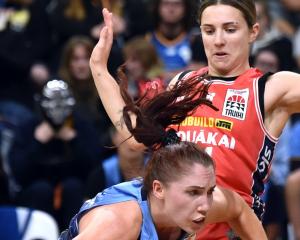
It was an influential group.
Names such as Kirk Penney, Sean Marks, Phill Jones and Pero Cameron spring to mind.
They were the ones who took New Zealand to the basketball World Cup semifinals in 2002.
They also played at two Olympic Games and were the first group of Kiwis to have several players carve out impressive overseas careers.
Dickel and many of those others are among those profiled in Ballin’ in Black, a soon-to-be-released book reliving the careers of the Tall Blacks’ 11 centurions.
Theirs were careers that paved way for many who have come since.
Dickel, who is from Dunedin and now lives in Las Vegas, told the Otago Daily Times basketball had come a long way in New Zealand since then.
"There’s a real pathway now for basketballers, whereas when I was growing up there really wasn’t a pathway to be a basketballer," Dickel said.
"There had been very few people go to college.
"No-one had really gone and played very well.
"The only player that had gone and done well was Stan Hill.
"It was kind of a dream to go over there and do well.
"Whereas the players now, they know a lot of New Zealanders can go over there and do well.
"There’s a pathway there. There’s a way to be a good basketball player and play all over the world."
He agreed the system now allowed New Zealand players better exposure to get overseas opportunities.
But he also said the players coming through now were better.
"They’re able to be comparable to more American kids, or kids all around the world, that are trying to go to play basketball, either in America or beyond.
"It’s a real credit to the coaches in New Zealand and everyone that’s working over there to help these kids on and off the court be appealing to American schools.
"Then the players doing the hard work and being competitive enough to come over here [the US] and play well."
Dickel had an illustrious playing career, although the World Cup success will always be remembered as one of his top achievements.
Despite that there was a feeling of disappointment from him that the team had not gone further — both there and at the Athens Olympics two years later.
He said there had been an element of good fortune to face sides the Tall Blacks matched up well with.
However, they fell to the eventual-champion Yugoslavia side in the semifinal, before going down to a Dirk Nowitzki-led Germany in the third-place playoff.
"When I look back on it, sometimes it’s better to be lucky than good.
"The 2002 team was nowhere as good as our 2004 team that we went to the Olympics.
"That was my takeaway from that.
"Just being disappointed that once you get to the semifinal you couldn’t go further.
"And just personally being disappointed in how I played in the semifinal. I thought I could have played a lot better.
"That was kind of my takeaway.
"You remember the stuff you want to do better at when you look back."












